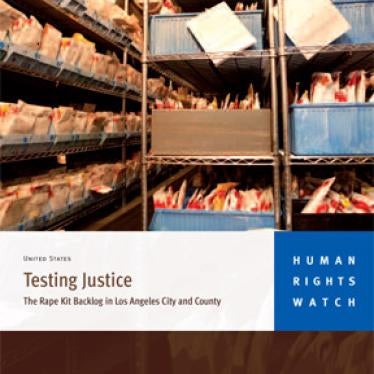(Los Angeles, January 15, 2010) - The announcement today by city leaders that new crime lab positions approved in this year's budget will not be funded makes it impossible for the Los Angeles Police Department to eliminate its backlog of untested DNA in rape cases, Human Rights Watch said today.
The 26 new crime lab positions were approved by City Council in May 2009, despite a near hiring freeze, at the request of the Los Angeles Police Department (LAPD). The police maintained that the positions were necessary to address a backlog of 7,000 untested sets of physical evidence in rape cases, known as rape kits, and to develop a long-term solution for efficient and effective rape kit testing. For the first time since the positions were approved, the city acknowledged today that the positions have not been funded and will not be filled.
"This announcement undermines public trust in the city's commitment to eliminate the rape kit backlog and bring real justice to rape victims," said Sarah Tofte, US Program researcher at Human Rights Watch and author of a March 2009 report on the rape kit backlog in Los Angeles. "The city, through the budget process, promised to hire the crime lab personnel needed to test in a timely way every booked rape kit and to upload the test results into the DNA database. The city has broken its promise."
DNA technology is one of law enforcement's most powerful forensic tools. It can provide a match with an unknown suspect, confirm the identity of a known suspect, affirm the details of a victim's report, and exonerate innocent suspects. Timely testing of rape kits can be critical to bringing justice to sexual assault victims. Rape cases are often difficult to solve or prosecute effectively without this forensic evidence. National studies have shown that cases in which a rape kit is collected, tested, and contains DNA evidence are more likely to move forward in the criminal justice system.
The LAPD has made substantial progress in using outside labs to test the majority of backlogged rape kits, but outsourcing alone will not solve the problem. By federal law, public crime lab personnel must review the test results of privately outsourced kits before the test results can be entered into the public DNA database. Outsourced rape kits wait an average of 72 days after testing before they are reviewed by crime lab personnel.
Without additional crime lab personnel the police cannot review the outsourced kits within a reasonable time, creating a growing secondary backlog of kits for which testing is not complete. Until testing is complete, the results are uploaded to the public DNA database, and DNA matches investigated, justice will continue to elude rape victims.
Los Angeles City Council President Eric Garcetti introduced a motion today to redirect some of the funds already lost due to the delay in hiring the crime lab personnel to outsourcing testing of rape kits to private crime labs. Human Rights Watch urges the city to reinstate approval for the additional personnel and to allocate the remainder of those funds to the LAPD, which should in turn hire those personnel immediately.
Last spring, the City Council made a commitment to provide regular oversight over the way the new funding for elimination of the rape kit backlog was spent and the actual progress made. The loss of funding for these crime lab positions is due in part to their failure to provide such oversight. Human Rights Watch urges the City Council to renew its commitment to oversight in order to regain the public's trust.
"Merely outsourcing the rape kits does not provide justice for past, present, and future rape victims," Tofte said. "This is a huge blow to policymakers, advocates, rape victims, and law enforcement across the country who hoped that Los Angeles would be a national model for other jurisdictions tackling their rape kit backlogs. Los Angeles is instead showing others what not to do."







